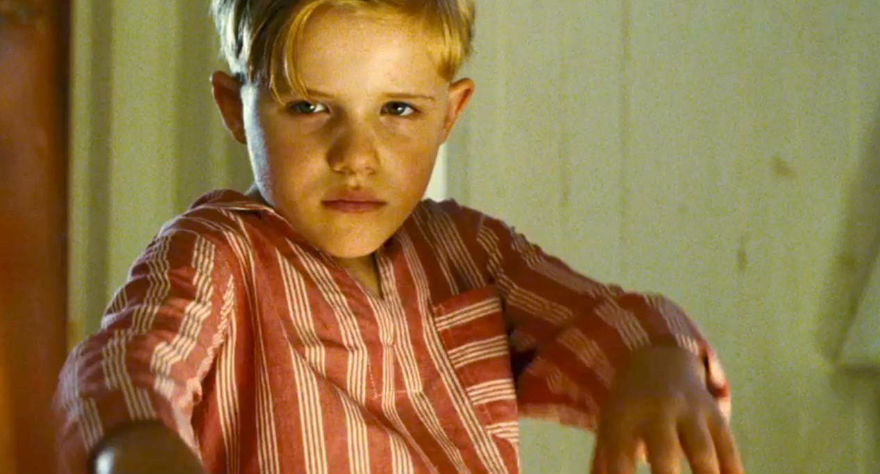
Misguided in almost every way, this is faith-based cinema at its worst.

Misguided in almost every way, this is faith-based cinema at its worst.
Director Alejandro Monteverde explores the subjects of war, racism, faith, and God with the grace of a bull in a china shop in Little Boy, a WWII-set, theologically tipsy melodrama. I spent most of its 105-minute runtime staring at the movie screen quizzically, trying to figure out what exactly Monteverde was trying to say with his small-town tale about a racist half-pint trying to pray his father back from the front lines. The storytelling is manipulative, bludgeoning you over the head with blunt symbolism so incessantly you’re too punch-drunk (or uninterested) to know (or care) what’s going on. At best, the film’s messaging is outdated; at worst, it’s insensitive and difficult to bear.
The story revolves around Pepper Busbee (Jakob Salvati), a 7-year-old with a stunted-growth condition that’s made him the primary target of the bullies prowling the sunny streets of his coastal home town, O’Hare, California. He finds solace and inspiration, though, in his father, James (a miscast Michael Rappaport), his “only friend.” Pepper’s got his mom, Emma (Emily Watson), and his boorish teenage older brother, London (David Henrie), but his dad is his world; they go on imaginary adventures together, fighting evil-doers and pumping each other up with the rallying cry, “Do you believe you can do this?”, which is almost as cheesy and awkwardly written as The Imitation Game‘s, “Sometimes it’s the people no one imagines anything of who do the things no one can imagine.”
As broad as Morten Tyldum’s Alan Turing tribute was, Little Boy makes that movie look like a Lars Von Trier art piece. Little Pepper embarks on a pilgrimage of faith when James gets sent to the front lines in the Japanese-occupied Philippines. A local priest, Father Oliver (Tom Wilkinson), hands him a “magical list” of good deeds the boy must complete to bring his father home, and Pepper immediately gets to work. An extra task is tacked onto the end of the list, however: Pepper must befriend Hashimoto (Cary-Hiroyuki Tagawa), the universally hated Japanese-American man who lives on the edge of town. Pepper and London had trespassed on his property the night before, throwing rocks at his house as they screamed “Jap!!!” at the top of their lungs, so Father Oliver thought it best to teach the kid a lesson in acceptance.
Though the two don’t get along at first (Hashimoto is a bit of a curmudgeon and Pepper…well, Pepper greets him by saying, “Hi, Jap! I want to hang out!”), they soon find a common bond in that they’re both town outcasts, Hashimoto for his ethnicity and culture, Pepper for his diminutive stature. (It’s clear who got dealt the worse hand, but the film treats their struggles as if they were equal, because racism.) The hot-headed London disapproves of his little brother’s new friendship to say the least; when he comes home to find Hashimoto sitting at the kitchen table, eating hot dogs with his family, his gut reaction is to stick a rifle in the poor man’s nose.
One of the movie’s most uncomfortable motifs is born out of Pepper’s fanaticism for a popular traveling magician, Ben Eagle (Ben Chaplin). Eagle stops in O’Hare on his national tour and invites our tiny hero up on stage to help him with an illusion, asking him to move a glass across a table with his mind. Pepper stretches his arms out in front of him like Magneto, makes the most horrendous sound you’ve ever heard (think constipation) and…presto! The glass slides toward him, Jedi-style. He attempts the mind trick over and over again throughout the film, with the occasional contrivance making it appear (to the dimwitted townsfolk, at least) as if the boy were a miracle worker of some sort.
History spoiler: “Little Boy” is the name of the atomic bomb the United States dropped on Hiroshima in 1945. Monteverde and co-writer Pepe Portillo handle the catastrophic event in the most agonizing way possible, showing the citizens of O’Hare rejoicing in the streets as they smile and scream at Pepper, “You did it, Little Boy! You did it!” What the hell? I couldn’t believe my eyes and ears. The thought crossed my mind that someone might be playing an elaborate prank on me; I half-expected the theater lights to raise, everyone in the audience to turn their heads, point, and laugh in my face. It was a true Twilight Zone moment.
To be clear, the filmmakers don’t advocate the Hiroshima bombing (I don’t think), but that they had the nerve to use a historical event that cost the lives of 129,000 Japanese men, women and children as a plot device in the story of an American boy who misses his dad is obnoxious.
In a film about supernatural saviors, the only true saviors are Watson and Wilkinson, whose intermittent appearances act as the only gasps of breath you’ll get in this goopy vat of preachy nostalgia that’ll only appeal to aging Christians, preppy youth counselors and their little minions. Christian rock music sucks not because it’s about Christianity, but because the music sucks. That principle can be applied to Little Boy as well; its faith-based cinema that’s well-intentioned enough, but fails badly because, as a piece of cinema, it’s decidedly sub-par. In the end, that’s all that really matters.